הסדרה לדת, לפילוסופיה ולתרבות האסלאם
-
מבצע פסח

עַבְּדֻ אלבַּהַאא עַבַּאס
ג׳ושוע לינקולן
₪48.00 – ₪100.00 למוצר זה יש מספר סוגים. ניתן לבחור את האפשרויות בעמוד המוצר -
מבצע פסח

מעבר לכפירה ולאסלאם
מפרסית: אורי מור מלאך
₪48.00 – ₪100.00 למוצר זה יש מספר סוגים. ניתן לבחור את האפשרויות בעמוד המוצר -
מבצע פסח

אל־חַלַּאג֗ / כִּתַאבּ אל־טַּוַאסִין
תרגום, מבואות וביאורים: אבי אלקיים
₪48.00 – ₪100.00 למוצר זה יש מספר סוגים. ניתן לבחור את האפשרויות בעמוד המוצר -
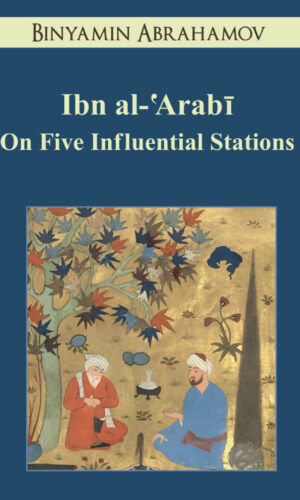
Ibn al-‛Arabī’s `
Binyamin Abrahamov
₪48.00 – ₪114.00 למוצר זה יש מספר סוגים. ניתן לבחור את האפשרויות בעמוד המוצר -

Abdu’l-Bahā Abbās‘
Joshua Lincoln
₪48.00 – ₪124.00 למוצר זה יש מספר סוגים. ניתן לבחור את האפשרויות בעמוד המוצר -

The Sufis’ and Ibn al-‘Arabī’s Attitudes Towards the Pillars of Islam
Binyamin Abrahamov
₪48.00 – ₪114.00 למוצר זה יש מספר סוגים. ניתן לבחור את האפשרויות בעמוד המוצר -
מבצע פסח
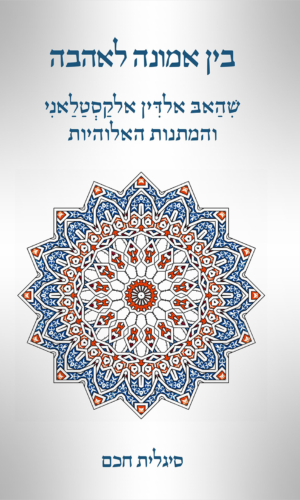
בין אמונה לאהבה – שִׁהַאבּ אלדִּין אלקַסְטַלַאנִי והמתנות האלוהיות
סיגלית חכם
₪48.00 – ₪80.00 למוצר זה יש מספר סוגים. ניתן לבחור את האפשרויות בעמוד המוצר -
מבצע פסח
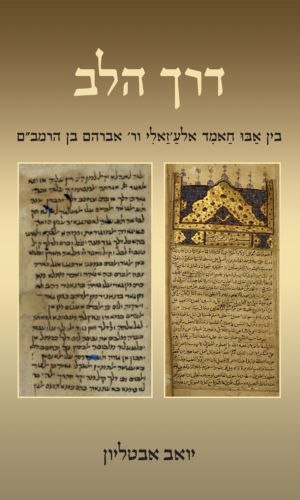
דרך הלב – בין אבו חאמד אלע׳זאלי ור׳ אברהם בן הרמב״ם
יואב אבטליון
₪124.00המחיר המקורי היה: ₪124.00.₪100.00המחיר הנוכחי הוא: ₪100.00. -
מבצע פסח
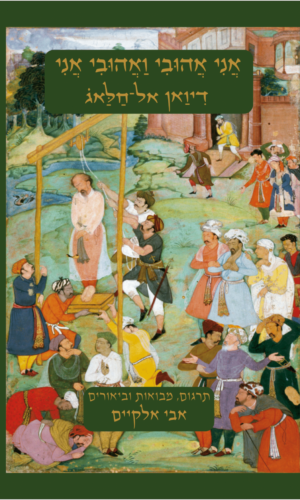
אני אהובי ואהובי אני / דִיוַאן אל־חַלַּאג֗
תרגם מערבית, הקדים מבואות והוסיף ביאורים: אבי אלקיים
₪48.00 – ₪110.00 למוצר זה יש מספר סוגים. ניתן לבחור את האפשרויות בעמוד המוצר -
מבצע פסח
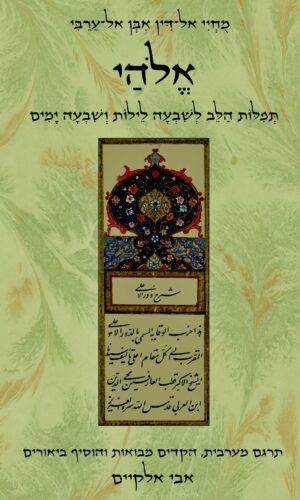
אלהי – תפילות הלב לשבעה לילות ושבעה ימים / מֻחְיִי אל־דִּין אִבְּן אל־עַרַבִּי
תרגם מערבית, הקדים מבואות והוסיף ביאורים: אבי אלקיים
₪48.00 – ₪110.00 למוצר זה יש מספר סוגים. ניתן לבחור את האפשרויות בעמוד המוצר -
מבצע פסח
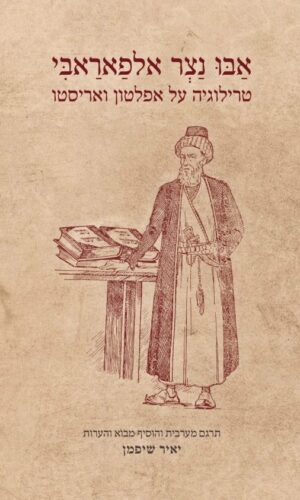
אבּוּ נַצְר אלפַארַאבִּי
תרגם מערבית והוסיף מבוא והערות: יאיר שיפמן
₪48.00 – ₪100.00 למוצר זה יש מספר סוגים. ניתן לבחור את האפשרויות בעמוד המוצר -
מבצע פסח
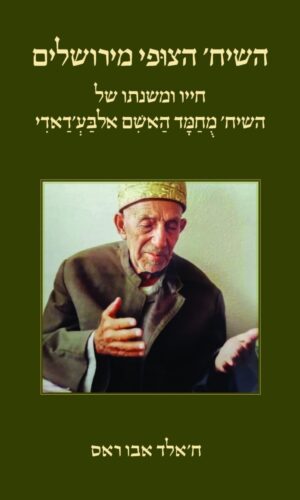
השיח' הצוּפי מירושלים חייו ומשנתו של השיח' מחמד האשם אלבּע'דאדי
ח'אלד אבו ראס
₪48.00 – ₪100.00 למוצר זה יש מספר סוגים. ניתן לבחור את האפשרויות בעמוד המוצר -
מבצע פסח
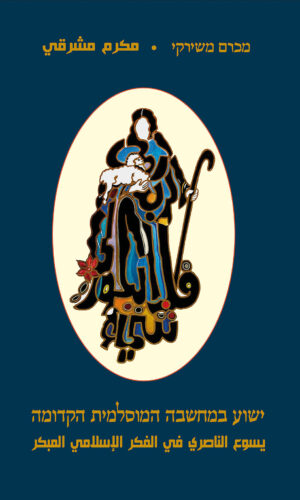
ישוע במחשבה המוסלמית הקדומה
מכרם משירקי
₪48.00 – ₪70.00 למוצר זה יש מספר סוגים. ניתן לבחור את האפשרויות בעמוד המוצר -
מבצע פסח

פירוש אבן רשד לספר המדינה לאפלטון
תרגם מחדש והוסיף מבואות והערות: יאיר שיפמן
₪124.00המחיר המקורי היה: ₪124.00.₪100.00המחיר הנוכחי הוא: ₪100.00. -
מבצע פסח

צוּפיוּת ויחסי יהודים-מוסלמיםִ | דרך אברהם – הדרך הצוּפית הישראלית
יפיע קתרין רנדל
₪144.00המחיר המקורי היה: ₪144.00.₪80.00המחיר הנוכחי הוא: ₪80.00. -
מבצע פסח

אלפאראבי – מבחר מכתביו המדיניים
תרגם מערבית והוסיף מבואות והערות: יאיר שיפמן
₪48.00 – ₪100.00 למוצר זה יש מספר סוגים. ניתן לבחור את האפשרויות בעמוד המוצר -
מבצע פסח

גן תבונת הלב / אלחַלַּאגֺ
תירגום, מבואות וביאורים: אבי אלקיים
₪144.00המחיר המקורי היה: ₪144.00.₪110.00המחיר הנוכחי הוא: ₪110.00. -
מבצע פסח
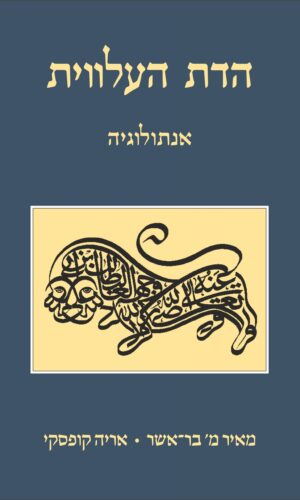
הדת העלווית – אנתולוגיה
מאיר בר-אשר ואריה קופסקי
₪48.00 – ₪100.00 למוצר זה יש מספר סוגים. ניתן לבחור את האפשרויות בעמוד המוצר -
מבצע פסח
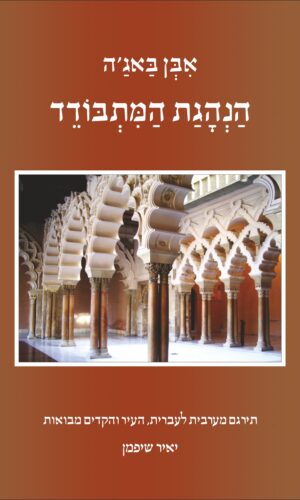
הנהגת המתבודד/ אבן באג׳ה
תרגים מערבית לעברית, העיר והקדים מבואות: יאיר שיפמן
₪48.00 – ₪80.00 למוצר זה יש מספר סוגים. ניתן לבחור את האפשרויות בעמוד המוצר -
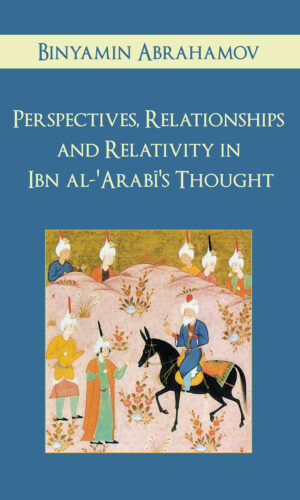
Perspectives, Relationships and Relativity in Ibn al-'Arabi's Thought
Binyamin Abrahamov
₪48.00 – ₪114.00 למוצר זה יש מספר סוגים. ניתן לבחור את האפשרויות בעמוד המוצר
בנימין אברהמוב
פרופ' בנימין אברהמוב הוא פרופסור אמריטוס של תיאולוגיה ומיסטיקה מוסלמית באוניברסיטת בר-אילן. הוא עסק בתורותיהם של המעתזלים, הזיידים, אלגזאלי ואבן אלערבי, וכמו כן במסורתיות לעומת שכלתנות באסלאם. הפרויקט הנוכחי שלו הוא תרגום מוער לעברית של יצירתו של ר' בחיי אבן פקודה חובות הלבבות.
מבין פרסומיו ניתן לציין את הספרים הבאים:
Al-Kāsim Ibn Ibrāhīm on the Proof of God's Existence: Kitāb al-Dalīl al-Kabīr, E.J. Brill, Leiden 1990; Anthropomorphism and Interpretation of the Qurān in the Theology of al-Qāsim ibn Ibrāhīm, E.J. Brill, Leiden 1996; Islamic Theology – Traditionalism and Rationalism, Edinburgh University Press 1998; Divine Love in Islamic Mysticism, The Teachings of al-Ghazālī and al-Dabbāgh, Routledge Curzon Sufi Series, London and New York 2003; Ibn al-‛Arabī and the Sufis, Anqa Publishing, Oxford 2014; Ibn al-‛Arabī's Fuṣuṣ al-Ḥikam – An Annotated Translation of "The Bezels of Wisdom", Routledge, London and New York 2015.
מאיר בר אשר
פרופ' מאיר מ' בר-אשר, ראש החוג לשפה וספרות ערבית באוניברסיטה העברית בירושלים, הוא חוקר האסלאם הקדום. הוא מתמחה בעיקר בחקר השיעה הקדומה וכיתות שפרשו מתוכה (כגון הדת הנוציירית-עלווית) וכן עוסק בחקר הקוראן ופרשנותו וביחס הגומלין שבין אסלאם ויהדות. הוא מלמד בחוג לשפה וספרות ערבית ומכהן כראשו מאז 2001 לסירוגין. כן כיהן כראש המכון ללימודי אסיה ואפריקה באוניברסיטה העברית וכראש מכון בן צבי לחקר קהילות ישראל במזרח. הוא פרסם וערך מספר ספרים בנושאים הנזכרים וכן עשרות מאמרים.
בין פרסומיו יצוינו חיבורו על פרשנות הקוראן השיעית
Scripture and Exegesis in Early Shi'ism (1999)
וכן ספרו על הדת הנוצריית-עלווית בשיתוף עם פרופ' אריה קופסקי
The Nusayri-'Alawi Religion: An Enquiry into Its Theology and Liturgy (2002)
הוא שימש כעורכי של כתב העת "ספונות" ומשמש עתה כאחד מעורכיו של כתב העת "קתדרה".
בקרוב עתידים לראות (בהוצאת מאגנס) אור הספר האסלאם – היסטוריה, דת, תרבות וחברה שהוא מבוא מקיף על האסלאם, שאותו ערך בצוותא עם עמיתו פרופ' מאיר חטינה ואנתולוגיה של שירה, מכתמים ודברי הגות מיסטית של המיסטיקן הנודע אַבּוּ אלחֻסַיְן מַנְצוּר אלחַלַּאג', שאותה תרגם וערך בשיתוף עם ד"ר אברהם אלקיים. החיבור האחרון עתיד להופיע בהוצאת אדרא.

יוסף ינון-פנטון
פרופ' יוסף ינון-פנטון הוא בעל הקתדרה ללשון עברית ומדעי היהדות וסגן-מנהל המחלקה לערבית ולעברית באוניברסיטת סורבון פריז. אחרי למודי יהדות ב- Jews‘ College בלונדון ובישיבות, הוא השיג תואר ראשון וMA בערבית מאוניברסיטת שטרסבורג והשתלם באוניברסיטת מר יוסף בבירות. הוא הכין את הדוקטוראט שלו תחת הדרכת ג׳ורג׳ ואידה באוניברסיטת סורסון בנושא כתבי ר׳ משה אבן עזרא בערבית יהודית. עבד כעוזר מחקר ביחידת הגניזה בקמברידג' לפני שקבל הקתדרה ללשון עברית באוניברסיטת שטרסבורג. היה מרצה אורח באוניברסיטת בר-אילן, ישיבה אוניברסיטה והאוניברסיטה העברית. שדה התמחותו הוא כל הבטי התרבות היהודית בהקשר האיסלמי במיוחד בתחומי המיסטיקה והצופיות, הפילוסופיה והתיאולוגיה והמוסיקה. במקצעות אלה הוא פרסם מחקרים רבים ביניהם:
דויד מימוני, מורה הפרישות, ירושלים (תשמ“ז), יוסף אבן וקאר, יסודות הקבלה, לוס אנג‘לס, (תשס“ד), יהודה אלחריזי, כתאב אלדרר, ירושלים, (תשס“ט) (עם יהושע בלאו ויוסף יהלום). מוחמד אבן זכרי, אצילות בני ישראל והערבים, מדריד, (2016). גלות המע׳רב: קורות יהודי צפון אפריקה תחת האיסלם (בדפוס).



